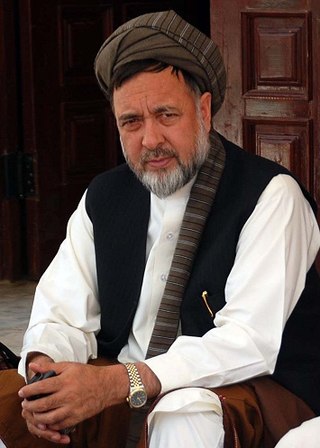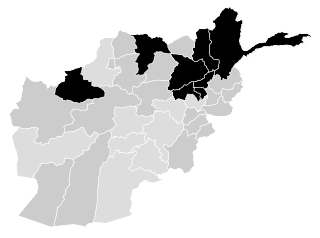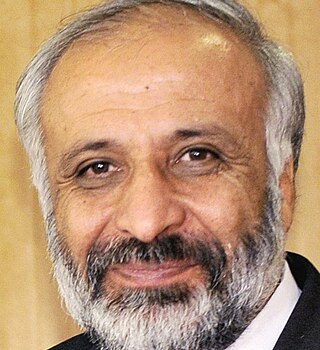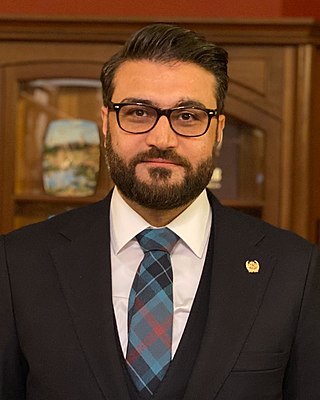
The government of Afghanistan is currently disputed following the effective collapse of the Islamic Republic of Afghanistan during the fall of Kabul to Taliban forces on 15 August 2021 and the subsequent re-establishment of the Islamic Emirate of Afghanistan which now exercises de facto control over most of the country. On 7 September 2021 the Taliban officials in de facto control of most of Afghanistan announced a new interim government headed by Mullah Mohammad Hassan Akhund as Prime Minister. The government is subject to the oversight of the Taliban's Supreme Leader, Haibatullah Akhundzada. As of 8 September 2021, the Islamic Emirate of Afghanistan has not yet been formally recognized as the de jure government of Afghanistan by any other country. The representatives appointed by the Islamic Republic of Afghanistan continue to represent the country at the United Nations. These representatives have refused to recognize the Taliban appointed government and have urged other countries to not recognize this government either.

The president of the Islamic Republic of Afghanistan was constitutionally the head of state and head of government of the Islamic Republic of Afghanistan (2004–2021) and Commander-in-Chief of the Afghan Armed Forces.

Mohammad Ashraf Ghani Ahmadzai is an Afghan former politician, academic, and economist who served as the president of Afghanistan from September 2014 until August 2021, when his government was overthrown by the Taliban.

Haji Muhammad Mohaqiq is an Afghan politician who served as a member of the Afghanistan Parliament. He is also the founder and chairman of the People's Islamic Unity Party of Afghanistan. During the 1980s, he served with the mujahideen rebel forces fighting against the Soviet-backed Afghan government during the Soviet-Afghan War. After the withdrawal of the Soviet Union in 1989, Mohaqiq was appointed as the leader of the Hezb-e Wahdat for northern Afghanistan.

Ahmad Zia Massoud is an Afghan politician who was the vice president of Afghanistan in the first elected administration of President Hamid Karzai, from December 2004 to November 2009. He is a younger brother of the late Ahmad Shah Massoud, the resistance leader against the Soviet invasion of Afghanistan and against the Taliban. In late 2011, Ahmad Zia Massoud joined hands with major leaders in the National Front of Afghanistan, which strongly opposed a return of the Taliban to power. The National Front was generally regarded as a reformation of the United Front which with U.S. air support temporarily removed the Taliban from power in late 2001.

Hashmat Ghani Ahmadzai commonly referred to as Hashmat Ghani, is an Afghan politician who is the Grand Council Chieftain of the Kuchis.

Presidential elections were held in Afghanistan on 20 August 2009. The election resulted in victory for incumbent Hamid Karzai, who received 49.67% of the vote, while his main rival Abdullah Abdullah finished second with 30.59% of the vote.

Abdullah Abdullah is a Pashtun Afghan politician who led the High Council for National Reconciliation (HCNR) from May 2020 until August 2021, when the Afghan government was overthrown by the Taliban. The council had been established to facilitate peace talks between the Islamic Republic of Afghanistan and the Taliban insurgents. Abdullah served as the Chief Executive of Afghanistan from September 2014 to March 2020, and as Minister of Foreign Affairs from December 2001 to April 2005. Prior to that, he was a senior member of the Northern Alliance, working as an adviser to Ahmad Shah Massoud. He worked as an ophthalmologist and medical doctor in the 1980s.

Mohammed Masoom Stanekzai is a former Minister, Chief Peace Negotiator, and chief of the National Directorate of Security (NDS) of the Islamic Republic of Afghanistan.

The National Coalition of Afghanistan, was a political coalition in Afghanistan led by Abdullah Abdullah, Afghanistan's former foreign minister (2001–2005) and main challenger of President Hamid Karzai in the 2009 Afghan presidential elections. Abdullah Abdullah was a close friend of the Northern Alliance leader Ahmad Shah Massoud who was assassinated two days before the September 11 attacks.

Presidential elections were held in Afghanistan on 5 April 2014, with a second round held on 14 June. Incumbent President Hamid Karzai was not eligible to run due to term limits. The registration period for presidential nominations was open from 16 September 2013 until 6 October 2013. A total of 27 candidates were confirmed to be running for office. However, on 22 October Afghanistan's Independent Election Commission disqualified 16 of the candidates, leaving only 11 in the race. By April 2014 three candidates gave up the race and decided to support some of the eight remaining candidates. Opinion polls showed Abdullah Abdullah and Ashraf Ghani as the front-runners and indeed the results of the first round of the election had Abdullah in the lead and Ghani behind him. The second set of results came after the run-off on 14 June, two months after the first round. Preliminary results were expected on 2 July and the final result on 22 July. However, widespread accusations of fraud delayed these results. As a result, John Kerry, then United States Secretary of State, mediated the negotiations between the two final candidates, Ghani and Abdullah. After a series of negotiations and talks between Ghani, Abdullah and Kerry, the two candidates agreed to sign an Agreement to form a National Unity Government based on 50–50 power sharing. As a result of that political agreement, a separate position was created for Abdullah as Chief Executive. The National Unity Government's term ran out after the next Afghan presidential election was held in September 2019.
The following lists events from 2014 in Afghanistan.
Parliamentary elections were held in Afghanistan on Saturday 20 October 2018 to elect members of the House of the People. 3,296,643 people voted, 42% of registered voters. They had originally been scheduled for 15 October 2016, but were initially postponed to 7 July 2018, and then again to 20 October. Much of the prelude to the elections focused on the debate over reforming the country's electoral laws. The current system is one of single non-transferable vote. Kandahar's election was held on October 27. Polls were also delayed in Ghazni, due to an intensifying Taliban insurgency in the province, and as of September 2020 still have not been held. The new Parliament was inaugurated on 26 April 2019.

Senior leaders of the Afghan Taliban have been stationed in Doha, Qatar, since the early 2010s. The original purpose for being there was to open an office that would facilitate political reconciliation between the Taliban, the government of Afghanistan, the United States and other countries. After the Taliban office building opened in 2013, peace negotiations were suspended following objections by the Afghan government that the office was being presented as the embassy of a government in exile. Taliban leaders remained in Doha with accommodation from the Qatari government, on the condition that the office cannot be used for public dealings.

Hamdullah Mohib is a Pashtun Afghan politician and former diplomat.

Presidential elections were held in Afghanistan on 28 September 2019. According to preliminary results, which runner-up Abdullah Abdullah appealed against, incumbent Ashraf Ghani was re-elected with 923,592 votes, 50.64% of the vote. After delays over disputed votes, Ghani was declared the winner in the final results on 18 February 2020. Abdullah Abdullah rejected the results and moved to set up his own parallel government and separate inauguration. However, Ghani was officially sworn in for a second term on 9 March 2020. The ensuing political crisis was not resolved until 16 May 2020, when Ghani and Abdullah signed a power-sharing deal in which Ghani would remain president and Abdullah would lead the peace talks with the Taliban when they start. Voter turnout was less than 20%.
Events in the year 2020 in Afghanistan.
The Enlightenment Movement or Junbesh-e Roshnayi is a grassroots civil disobedience movement of Hazaras created in 2016 in Afghanistan in response to the Afghan government's change in routing plans for proposed international electricity networking, which was perceived as continuing historical anti-Hazara discrimination. The group organised major protests in Afghanistan and internationally during 2016 and 2017, protesting against discrimination. The group's youthful leadership challenged traditional Hazara leaders for representativity of the community.

The Islamic Republic of Afghanistan was a presidential republic in Afghanistan from 2004 to 2021. The state was established to replace the Afghan interim (2001–2002) and transitional (2002–2004) administrations, which were formed after the 2001 United States invasion of Afghanistan that had toppled the partially recognized Taliban-ruled Islamic Emirate of Afghanistan. However, on 15 August 2021, the country was recaptured by the Taliban, which marked the end of the 2001–2021 war, the longest war in US history. This led to the overthrow of the Islamic Republic, led by President Ashraf Ghani, and the reinstatement of the Islamic Emirate under the control of the Taliban. While the United Nations still recognizes the Islamic Republic as the legitimate government of Afghanistan, this toppled regime controls no portion of the country today, nor does it operate in exile; it effectively no longer exists. The Islamic Emirate is the de facto ruling government. The US–Taliban deal, signed on 29 February 2020 in Qatar, was one of the critical events that caused the collapse of the Afghan National Security Forces (ANSF). Following the deal, the US dramatically reduced the number of air attacks and deprived the ANSF of a critical edge in fighting the Taliban insurgency, leading to the Taliban takeover of Kabul.

Mohammad Zahir Aghbar, is an Afghan diplomat and law enforcement official. He currently serves as Afghanistan's ambassador to Tajikistan and has also claimed the title of acting First Vice President of Afghanistan.

















